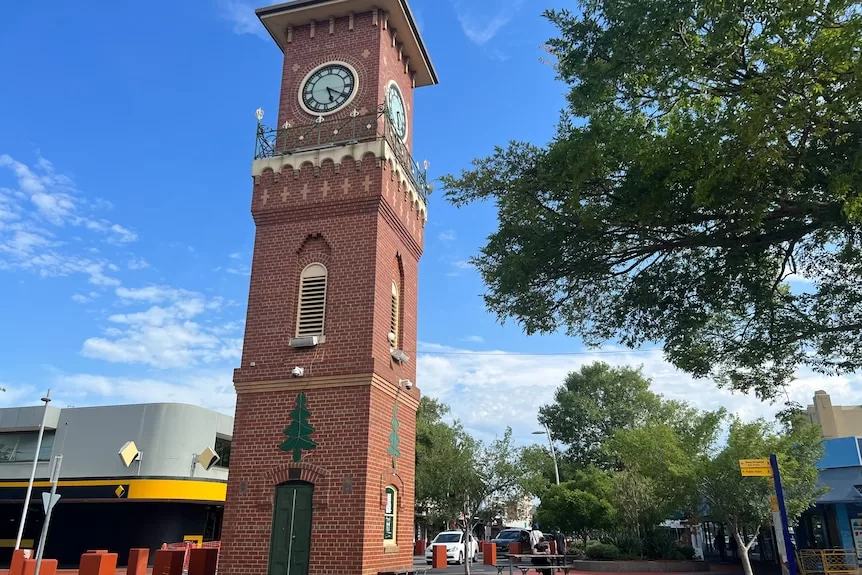After 40 years on the job, the time has come for Sale’s chief clock winder Bruce Arnup to hand over the keys.
Key points:
- Sale’s chief clock winder is retiring after 40 years of looking after the clock
- The replica tower was opened in 1888 and the original T Gaunt clock is still working
- The clock is wound by a group of volunteers on a weekly basis
Sale’s clock tower, which stands in the main street of the small Gippsland town, is a replica of the original tower which featured as part of the post office built in 1886.
After the post office closed Mr Arnup and a group of avid historians decided to construct a replica of the clock tower, and in 1988 to mark the nation’s bicentenary the current Sale clock was opened.
The clock tower is home to the original T Gaunt clock from the post office and thanks to a group of dedicated clock winders, who wind it each week, locals witness a slice of history each day.
Mr Arnup, now 72, has been winding the clock for four decades and is retiring due to the physical demands of the role.
“It’s a straight climb of 65 feet and it’s precarious … so it’s time to pull the pin and, so to speak, wind back,” Mr Arnup said.
“I have handed over the reins to a very capable clock winder by the name of Craig Hanson.
“He’s a local guy and is very enthusiastic. Every time he sees the clock he makes sure it’s up there being wound, which is really good.”
Mr Arnup said the clock needs winding once a week so it’s essential a local takes on the role.
“It takes a bit of maintenance. There’s a few little gadgets that seem to be a bit temperamental, but overall it’s in remarkably good order,” he said.
“There aren’t many hand-wound clocks in today’s world.”
Australian Antiquarian Horological Society member Fergus Forsyth, who studied clock restoration in Sussex, said many of Victoria’s clocks are T Gaunt clocks which were made during the 1800s.
“A lot of clocks around Victoria were bought in by Gaunt, who was a clock maker … he imported mechanisms from the UK and he was active throughout the 1800s,” he said.
“Into the late 1700s [and] early 1800s was when a lot of the municipal clocks were made, and that’s when you would have started seeing them.
“It showed a council had wealth.”
Mr Forsyth said while many of us have digital clocks in our pockets, there is still a place for mechanical clocks.
“Obviously my love of these things makes me slightly biased, but I think clocks still have a place on a historical basis.
“Whether people really need them for time-telling, that’s another matter.”
For Sale’s new clock master Craig Hanson, bringing back the need for the municipal clock was at the front of his mind.
“Some people say the clock isn’t reliable, so they don’t look at it. My goal is to make it more reliable so people do look at it to tell the time,” Mr Hanson said.
“Bruce has set the bar pretty high so I am hoping to attain that bar.”
Mr Hanson’s history with the clock dates back to its inception. His uncle’s father, Albey Freitag, coordinated the construction of the replica in 1988.
He said the clock was an iconic element of the Sale streetscape.
“It’s a bit of an icon for Sale. If you google Sale, one of the first images that comes up is the clock tower, and I think we all take it a little bit for granted,” he said.
“It’s been there for 40 years now [and] it’s an icon.”
Get our local newsletter, delivered free each Tuesday
